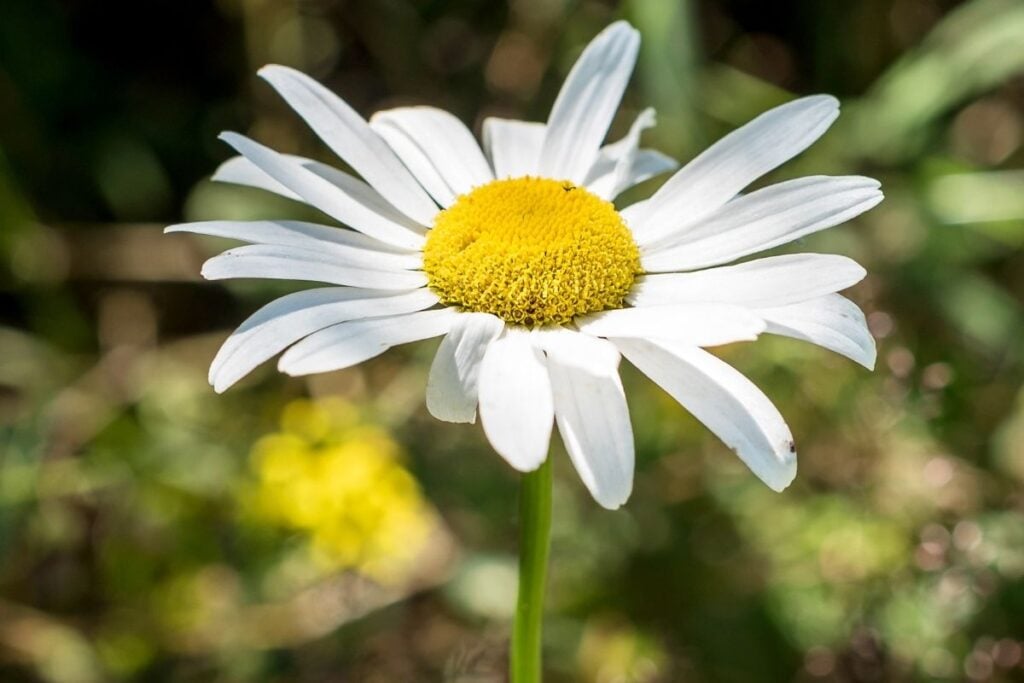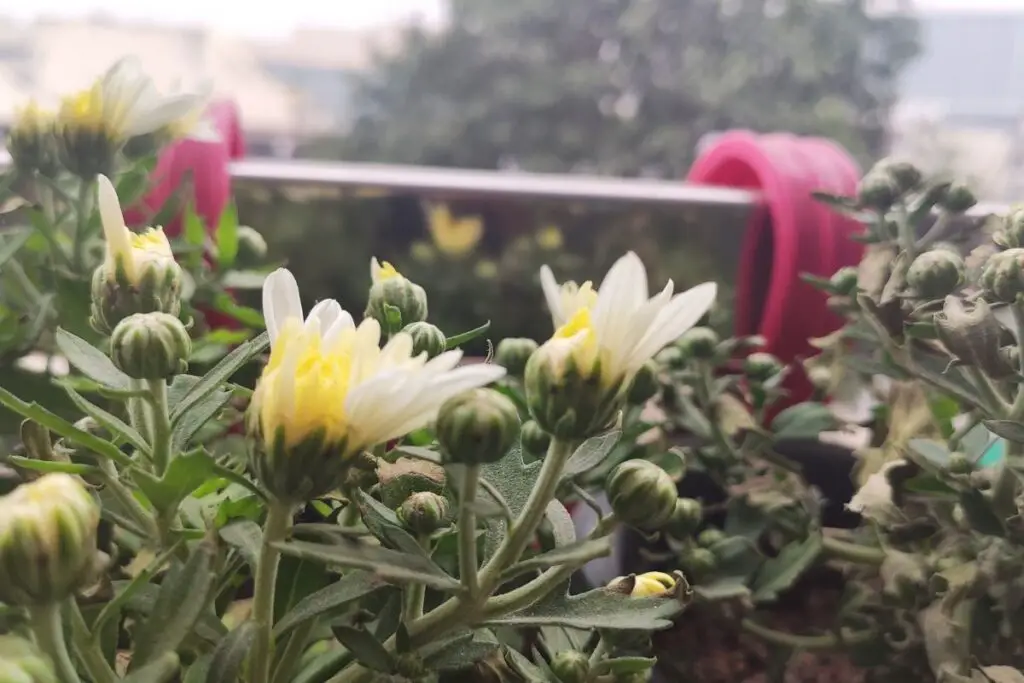Light is an integral part of a plant’s life and the only source through which it can synthesize its food. We must understand the light requirements of the Daisies to make them flourish.
Since it is primarily an outdoor plant, scarce sunlight can hinder the growth of a daisy plant, and it also increases the chances of a fungal infection. So, make sure your daisies are getting adequate amounts of sunlight throughout the day. But how much light do daisies need? Let’s find out!
As a general rule, daisies need 6-8 hours of sunlight daily. If the weather is cool, they can be under the full sun for the entire day. However, during hot summer, you need to provide light shade to your daisies during the afternoon to prevent any damage to their foliage.
You will need to find a corner in your garden which receives adequate sunlight throughout the day and plant your daisies there, and you will see them increasing rapidly.
Let’s find out what shall be the adequate amount of sunlight for the daisies in this article.

Importance of sunlight for daisies
Apart from Gerbera daisies, most daisy plants are outdoor plants, and there is a reason for that. Daisies thrive in bright and direct sunlight in excellent climatic conditions. Since they tend to multiply rapidly, they require a lot of the sun for synthesizing sufficient food for their survival and sustainability.
If you are planning to plant daisies in your backyard, it is a great idea. They can be planted along the fence or can remain scattered in bunches in different corners. You need to take care of the only thing is that they receive sunlight throughout the day unless you live in sweltering climatic conditions.
Adequate sunlight will help the daisies to grow faster and less likely to be infected with fungus and other diseases. Their growth is dense when they receive good sunlight, and it makes them sturdy.
Therefore, you need to ensure that your daisies receive at least six hours of good sunlight every day.
What kind of light does a daisy need?
Daisies need a good amount of direct sunlight for a greater part of the day as it is a fast-growing perennial plant with a fibrous root system that keeps growing deep within the soil to draw moisture and nutrients. Due to this reason, the plant multiplies faster and needs more and more sunlight as it grows. So, make sure not to plant it in a place where the sunlight is scanty.
The daisy (Bellis perennis) plants can adapt quickly and survive in almost all weather conditions, but you need to keep in mind that it might need some shade in the afternoon if it is too hot and dry.
Generally, these plants grow well in cooler regions with bright direct sunlight and thrive in winters.
Looking for gardening supplies? We have tested 100's of products before recommending them to you guys. Check out our best pick below:
| Image | Gardening Supplies | Best Price? |
|---|---|---|
 Top
Top Top
Top | Raised Garden Bed Kit | Check On Amazon |
 | XLUX Soil Moisture Meter, Plant Water Monitor, Soil Hygrometer Sensor for Gardening, Farming, Indoor and Outdoor Plants, No Batteries Required | No Results |
 Top
Top Top
Top | 82 Pcs Garden Tools Set and Extra Succulent Tools Set | Check On Amazon |
 | Joeys Garden Expandable Garden Hose with 8 Function Hose Nozzle, Lightweight Anti-Kink Flexible Garden Hoses, Extra Strength Fabric with Double Latex Core, (50 FT, Black) | No Results |
 Top
Top Top
Top | Dual Chamber Compost Tumbler | Check On Amazon |
 Top
Top Top
Top | Sunnyglade Plant Stakes | Check On Amazon |
 Top
Top Top
Top | Organic Cold Pressed Neem Seed Oil | Check On Amazon |
 Top
Top Top
Top | Mighty Mint Gallon :-Insect and Pest Control Peppermint Oil | Check On Amazon |
 Top
Top Top
Top | Scotts DiseaseEx Lawn Fungicide | Check On Amazon |
 Top
Top Top
Top | Jacks Classic 20-20-20 All Purpose Fertilizer | Check On Amazon |
 Top
Top Top
Top | 30,000 Seeds Pollinator Attracting Wildflower Mixture | Check On Amazon |
 Top
Top Top
Top | Survival Vegetable Seeds Garden Kit-Over 16,000 Seeds | Check On Amazon |
Best spot for daisies

Always choose a bright and sunny spot in your garden for the daisies. If you have bright and sunny corners in your backyard or the sun is blazing down along the fence of your garden all day, then those are the most suitable spots for your daisy plants.
Since they grow in bunches densely, they look beautiful along the fence or in symmetrical positions in the garden. But don’t forget, the spot should have direct sunlight. Only in scorching and dry conditions, you need to provide shade to avoid drooping and sunburn.
Therefore, any spot that receives direct sunlight throughout the day is excellent for your daisy plant, and you will see them thriving and blooming beautifully when the right season comes.
Direct sunlight is not a problem for the daisies, especially if you live in cool climatic conditions. They can make your garden look beautiful during a bright sunny spring day when fully bloomed.
| Aspect of Light | Daisy Light Requirement |
|---|---|
| Amount of Sunlight | 6-8 hours of direct sunlight daily |
| Ideal Growing Season | Cooler regions with bright sunlight and thriving in winters |
| Suitable Growing Spot | Bright and sunny locations in the garden, preferably with direct sunlight throughout the day |
| Signs of Too Much Sun | Bleached pigments – Leaf burn – Scaly leaves – Dry soil – Droopy flower petals – Curling of leaves – Dull flowers |
| Signs of Not Enough Light | Leggy growth – Leaning – Not flowering – Discoloration of leaves – Slow growth – Less dense |
| Minimum Sunlight Required | At least 6 hours of direct sunlight daily |
Are my daisies getting too much sun?
Unless you live in hot and dry conditions, the sun is never too much for the daisies. If the soil is holding enough moisture, you need not worry about the sunlight and leave your daisies to thrive.
But if you live in hot and dry conditions, then your daisies can show some signs of being exposed to harsh sunlight.
- Bleached Colorings
- Leaf burn
- Scaly leaves
- Dry soil
- Droopy flower petals
- Curling of leaves
- Dull flowers
The above signs will suggest that the sun rays are beating down harshly on the flowers and plants and the daisies need some shade and moist soil.
But looking at the dry topsoil, you might think that it needs a lot of water, but you need to make sure the soil is not muddy and watery, and it should just be moist.
You will need to determine the needs of your plant by observing it and the current weather conditions. If it is a bit too hot and dry, provide some temporary shade to the plant.
You will also need to trim the dried-out flowers regularly so that your plant looks fresh and you don’t get deceived by its looks. It will also grow faster if you cut the dried-out parts so that they can quickly recover from the burns.
Signs that your daisies are not getting enough light

During the blooming season, if your daisies are not producing enough flowers, it means they are not receiving enough sunlight. They can also show the below-mentioned signs in case of lack of light.
- Leggy growth
- Leaning
- Not flowering
- Discoloration of leaves
- Slow growth
- Less dense
Light helps your daisies to grow, thrive and bloom. If the daisies don’t get enough light, they will not grow fast. They will instead try to conserve food, and hence the rate of growth will slow down. You will also be able to notice the above symptoms due to lack of light and photosynthesis.
If you plant the daisies in a spot that doesn’t get enough light, you can dig and move them to a place in your garden where they will receive direct sunlight all day.
What if you don’t have a back yard or an outdoor garden?
You need not worry if you do not have an outdoor garden. You can still plant daisies at your place, on the terrace, or on the balcony, where the sunlight falls directly most of the day.
You can take a large pot to plant the daisies, and as they start to grow and multiply, you can divide them into another pot.
The only thing you need to take care of, wherever you keep it, is that it should receive sunlight throughout the day. And keep trimming it to enhance its growth and flowering.
How many hours of sunlight do your daisies need?
Sunlight is the most significant aspect of the growth and flowering of daisy plants. The whole appearance of daisies depends on how much direct sunlight they receive. The daisies need a minimum of 6 hours of direct sunlight, and the more it gets, the better it is for the plants. Less than 6 hours of light will not suffice for them; it is no surprise that they are outdoor plants.
You need to maintain the daisies by cutting out the dried-out flowers and providing an adequate amount of moisture. The sun will take care of the rest throughout the day.
During the spring, the daisies bloom and cover the whole bush with bright white flowers provided it gets maximum sunlight during the day.
Final Thoughts
As outdoor plants, daisies love direct sunlight throughout the day. For your daisies to thrive well with sturdy stems and beautiful blooming flowers, they will need a minimum of six hours of direct and regular sunlight.
You will need to keep the daisies away from two situations:
- Shady spot: This can hinder the growth of the plant as well as its flowering.
- Hot and dry conditions: This can take the moisture away from the soil, leaves, and flowers, due to which the plant can look dry and dull.
If you ensure that your plant is getting enough direct sunlight and at the same time not getting burnt by the scorching hot and dry weather, your daisies will make your garden look beautiful in the spring season with blooming white flowers.
Ref: Wikipedia, Britannica, University Of Florida, Ucanr.edu
